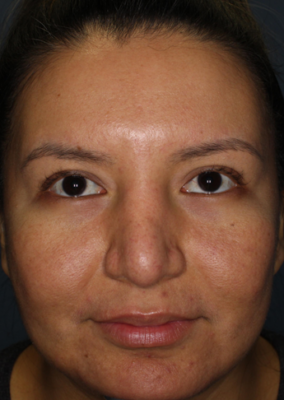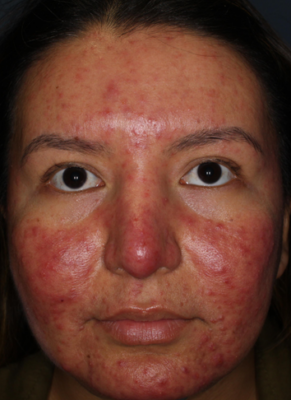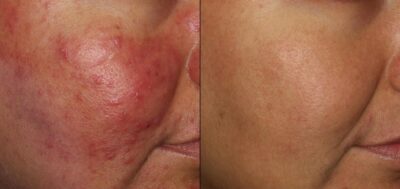
In 2011, when Rikki Baker started developing redness and small, pus-filled spots on her cheeks and chin, she thought she had acne.
“I wasn’t sure what it was so I went to a walk-in clinic to see a doctor. I was diagnosed with acne. They treated me for acne and it got way worse after that,” says the wife and mother.
“I stopped with the acne treatment and tried to treat it myself with over-the-counter medications and creams and different face washes. I changed my makeup. I was even reading online about weird treatments and experimental things people were doing,” Rikki adds.

So began a four-year struggle as she searched for a correct diagnosis and treatment for her skin condition. During this time, Rikki’s face became redder, the acne-like pimples continued and her skin was very irritated. “My face was even swollen in places and painful to the touch,” she recalls.
“I would never leave the house without a lot of makeup to cover it. But there is no hiding rosacea. Even with makeup, you could still see the rough texture of my skin. And then people would comment on that. One time I did venture out without makeup and my neighbour said ‘Oh, what happened to your face?’ She tried to recommend some lotions…”
“It was years of struggling and hopelessness. Really a dark time having to deal with that. I didn’t know anyone else with rosacea. I did see a few doctors over the next few years but was told different things each time. One thought it was an allergic reaction, some didn’t know what it was.”
2015 marked the start of a breakthrough for Rikki. She returned to the same drop-in clinic and saw a different doctor. “He told me he knew of someone who treats something called rosacea. That’s the first time I ever heard someone mention rosacea. He gave me hope.”
The same doctor asked Rikki how her skin was affecting her. “It was the first time anyone had asked me about that and I was just really emotional when I told him how much I was suffering. It was really affecting my state of mind and mental health because it was just getting worse and worse.”
Rikki was referred to a dermatologist who specializes in treating rosacea. “She knew right away what it was. I was very happy about that. She gave me medication and told me about steps to help relieve it – even a simple thing like using sunscreen. I had never used sunscreen before.

“My skin was so rough and scaly and dry that previously before I saw her I would exfoliate to try to smooth it out without knowing it just made it way worse. She gave me advice on using gentle skincare and ingredients to avoid.”
Starting treatment did result in some side effects early on such as skin burning but Rikki persevered. “It wasn’t long before I started seeing it was making a difference. It was fantastic! I was so happy because once it started calming down I could go out without wearing makeup. Little things like that gave me a lot more freedom. It made my life a lot easier and boosted my confidence.”
It took between 6 months to a year to get her rosacea under control. “It was quite a process but so worth it! I’ve been maintaining that ever since with medication, skincare and laser treatments as well. I avoid the sun as much as possible and bought myself a little sun umbrella. Now I can go out without makeup, take my child to school and not worry,” says Rikki.
One of the messages she has to share with others is that early on she came across information that rosacea mainly affected people with fair skin. “Since I have a darker skin tone, I kind of wrote that off as a cause. So it’s important to know that rosacea can affect people of darker skin tones as well.”
Her final message to those struggling with rosacea is: “Don’t give up. Keep trying to find ways to bring it under control!”
April is Rosacea Awareness Month, an opportunity to educate and improve understanding of this common skin condition affecting 3 million Canadians. Click here for more information about rosacea, the signs of rosacea, triggers and treatments.
Other articles: